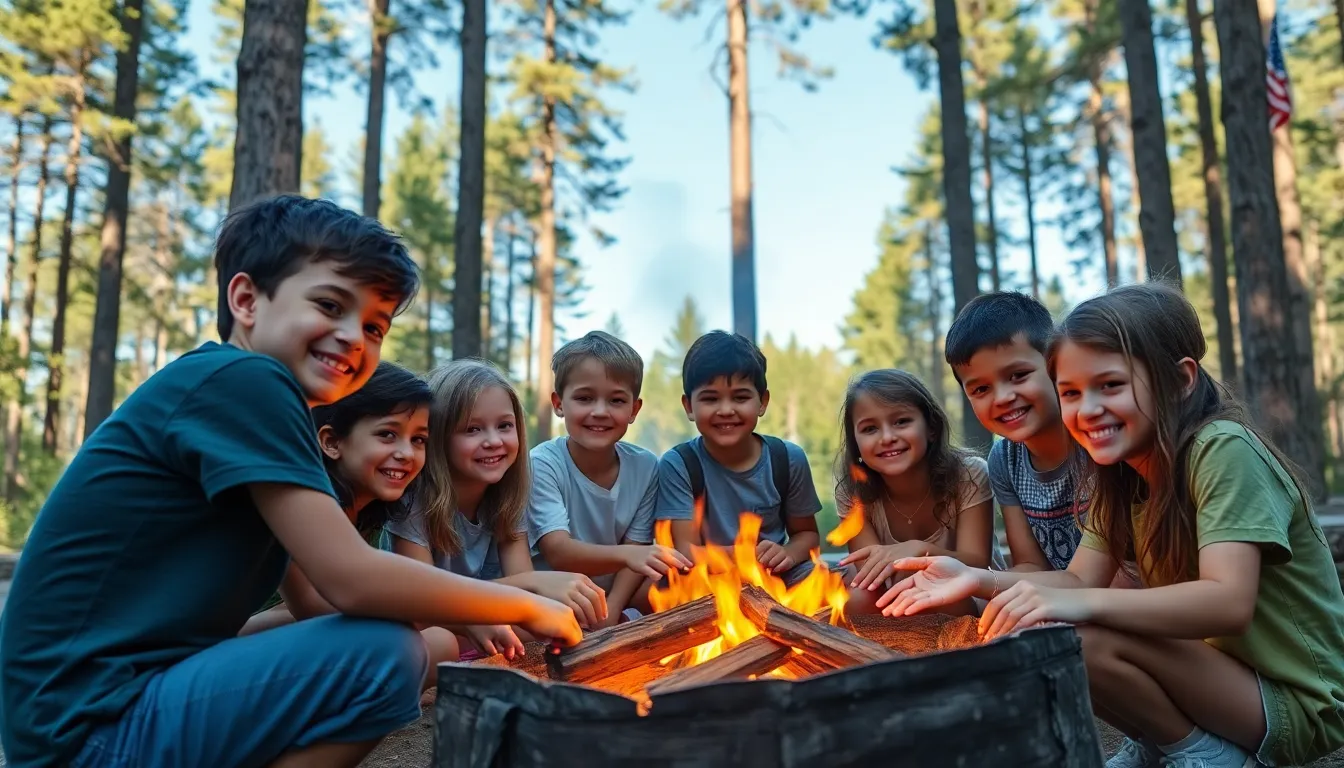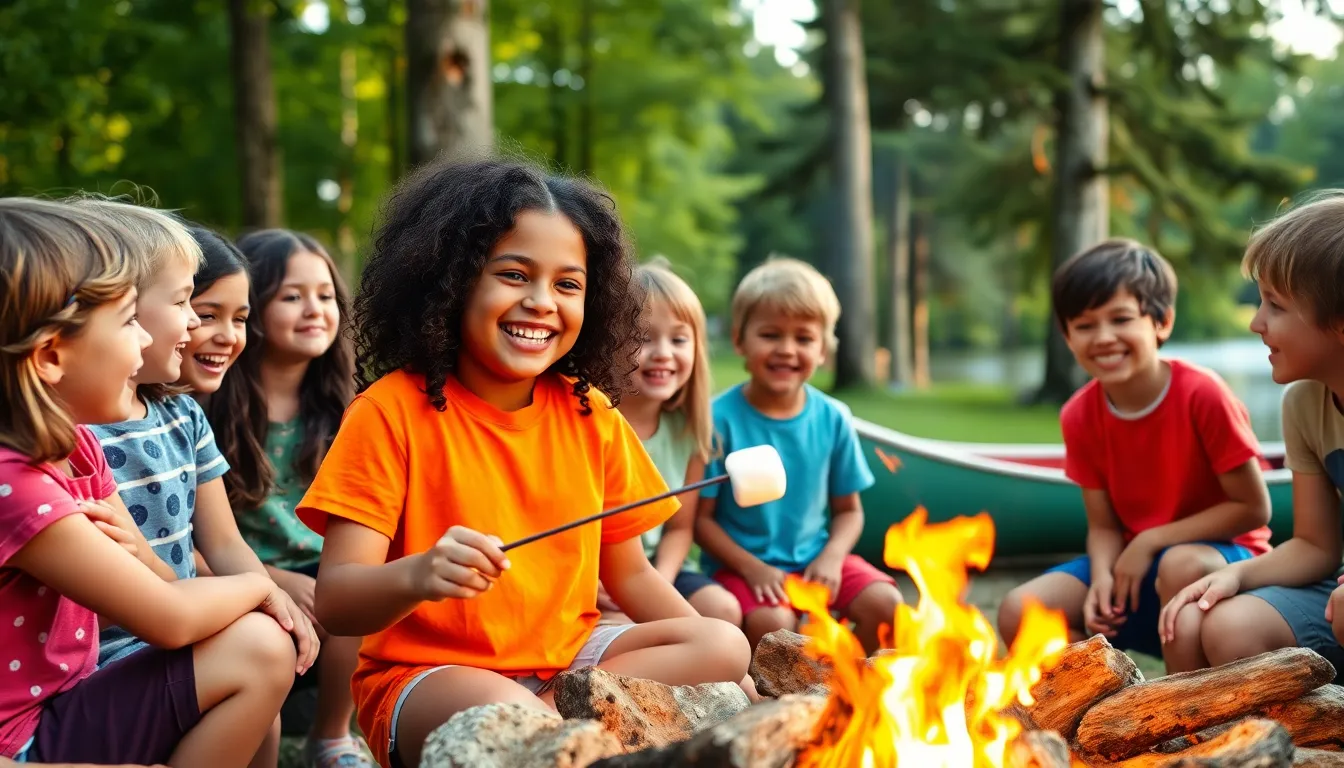As the school year wraps up and the sun shines brighter, kids everywhere eagerly anticipate the magic of traditional summer camps. These beloved retreats offer more than just a break from academics; they provide a unique opportunity for children to explore, learn, and form lasting friendships. From campfires and canoeing to arts and crafts, summer camps create unforgettable memories that shape young lives.
In a world increasingly dominated by technology, these camps stand out as a haven for creativity and personal growth. They encourage kids to step outside their comfort zones, fostering independence and resilience. Whether it’s the thrill of hiking through the woods or the joy of singing under the stars, traditional summer camps continue to play a vital role in childhood development, making them a cherished experience for generations.
Table of Contents
ToggleOverview Of Traditional Summer Camps
Traditional summer camps serve as a vital resource for children, combining outdoor activities with social development. Camps typically range from one to eight weeks, immersing children in nature and various recreational activities. Organized activities include swimming, hiking, crafts, and team sports, allowing participants to pursue interests while building skills.
Camps often emphasize principles of teamwork and leadership, fostering friendships among campers. Campfire gatherings promote bonding and storytelling, while group outings encourage cooperation and communication. These interactions are crucial for developing social and emotional competencies.
The physical environment of traditional summer camps enhances personal growth. Many camps are located in natural settings, supporting activities such as canoeing and rock climbing. Nature excursions instill a sense of appreciation for the outdoors, encouraging environmental stewardship.
Traditional summer camps prioritize a screen-free experience. By disconnecting from technology, campers engage in face-to-face interactions, enhancing their communication skills. Camps create an environment conducive to creativity, independence, and resilience, crucial elements for childhood development.
Overall, traditional summer camps provide a well-rounded experience, equipping children with essential life skills while fostering cherished memories.
Benefits Of Attending Traditional Summer Camps

Traditional summer camps offer significant advantages to children, focusing on personal growth and enhanced social abilities while immersing them in enriching experiences.
Personal Development
Traditional summer camps promote personal development through structured activities and challenges. Campers engage in various tasks that encourage self-discovery and independence. For instance, children can learn new skills like archery, rock climbing, or cooking, fostering confidence and self-esteem. They confront challenges in a supportive environment, allowing them to develop problem-solving abilities and resilience. This combination of exploration and achievement nurtures a sense of autonomy, preparing them for future endeavors. Additionally, the absence of technology provides an opportunity for reflection, enabling campers to connect with themselves and rediscover their passions.
Social Skills
Traditional summer camps play a pivotal role in enhancing social skills among children. They create an environment that encourages teamwork through group activities like relay races, scavenger hunts, and arts and crafts projects. Campers learn to communicate effectively, share responsibilities, and solve conflicts collaboratively. These interactions cultivate friendships and foster a sense of community. Participation in campfire gatherings and collaborative games emphasizes the importance of empathy and cooperation. Over time, children build essential social competencies that extend beyond the camp experience, aiding their ability to interact positively in school and other settings.
Activities Offered At Traditional Summer Camps
Traditional summer camps offer a wide array of activities that engage children physically and creatively. These experiences foster skill development and enhance personal growth while providing avenues for fun and friendship.
Arts And Crafts
Arts and crafts activities at traditional summer camps allow children to express their creativity. Campers engage in painting, pottery, and jewelry-making projects, using various materials to create unique artworks. These activities cultivate fine motor skills while encouraging self-expression and imagination. Camp instructors often guide projects, helping campers learn techniques and discover new talents. Additionally, collaborative art projects promote teamwork and sharing, enhancing social bonds among peers.
Sports And Outdoor Activities
Sports and outdoor activities form the backbone of traditional summer camps, offering children the chance to stay active. Swimming, hiking, and sports such as soccer, basketball, and volleyball build physical fitness and coordination. Group competitions and team challenges foster teamwork, strategic thinking, and leadership skills. Outdoor adventures like canoeing or zip-lining provide thrilling experiences that encourage risk-taking and resilience. Camps often organize nature hikes, promoting an appreciation for the environment and teaching children about local ecosystems. These outdoor activities create an energetic atmosphere that bolsters social skills and promotes lasting friendships.
Choosing The Right Traditional Summer Camp
Selecting a traditional summer camp involves evaluating several factors to find the best fit for a child’s growth and happiness. Important considerations include age appropriateness and the camp’s philosophy and values.
Age Appropriateness
Age appropriateness plays a crucial role in camp selection. Camps typically have designated age groups to ensure activities align with children’s developmental stages. Most camps cater to children aged 6 to 16, offering tailored programs that suit each age range:
- Younger campers (ages 6-9) participate in introductory activities like nature exploration and basic arts and crafts, fostering early social skills.
- Middle campers (ages 10-12) engage in skill-building activities, such as team sports, which encourage cooperation and communication.
- Older campers (ages 13-16) experience leadership opportunities and advanced outdoor activities, promoting independence and personal growth.
Choosing a camp specifically designed for the child’s age group increases the likelihood of enjoyable and safe experiences.
Camp Philosophy And Values
Camp philosophy and values reflect the environment and learning approach campers will experience. Different camps emphasize unique principles that shape their programs:
- Inclusivity: Some camps focus on fostering an inclusive environment that celebrates diversity and encourages friendships among all campers.
- Nature Connection: Camps prioritizing environmental stewardship engage children in ecological activities, teaching them appreciation and responsibility for nature.
- Personal Growth: Philosophy centered on personal development emphasizes self-discovery, resilience, and confidence-building through structured challenges.
Assessing a camp’s philosophy and values against the child’s needs helps ensure a supportive and enriching experience.
Traditional summer camps offer invaluable experiences that shape children’s lives. By immersing them in nature and engaging them in diverse activities, these camps foster personal growth and essential social skills. Campers build lasting friendships while developing independence and resilience in a supportive environment.
As technology continues to dominate daily life, the screen-free atmosphere of summer camps provides a refreshing break. This unique setting encourages creativity and self-discovery, helping children connect with their passions. Ultimately, traditional summer camps create cherished memories that resonate long after the summer ends, making them a vital part of childhood development.




